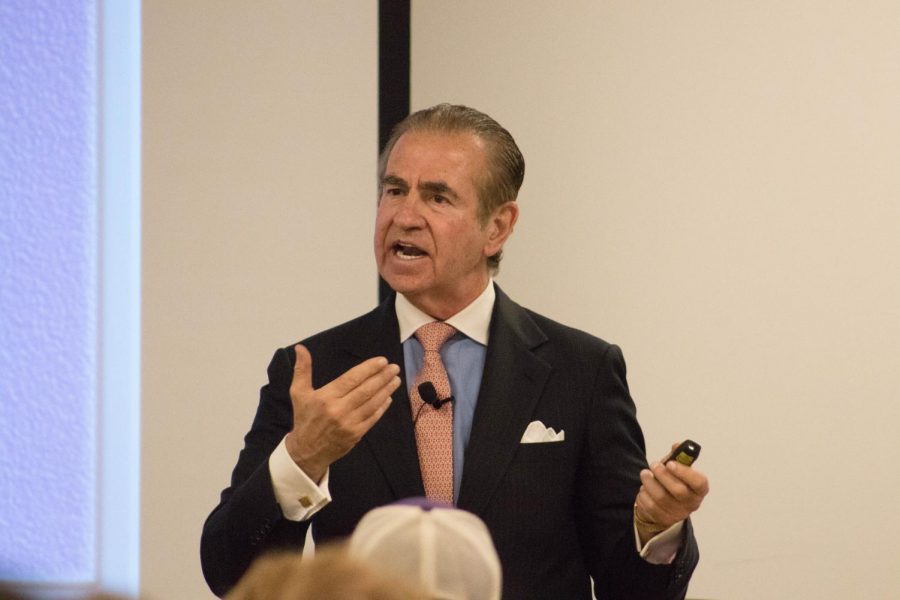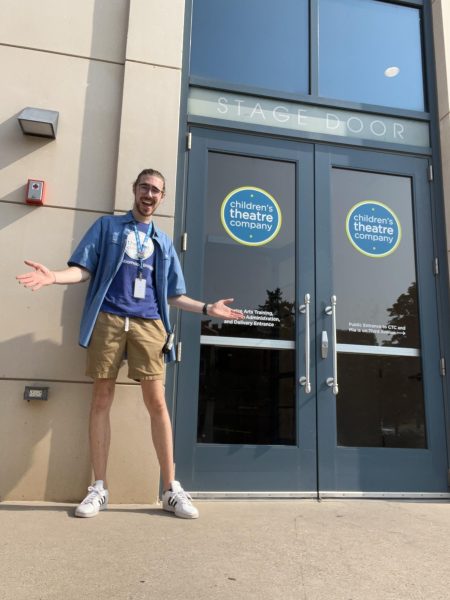Renowned PR professional visits
Public relations professional Fraser Seitel visited UNI this Tuesday to talk about PR in the era of nationalism.
Mar 29, 2018
UNI welcomed Fraser Seitel to campus on Tuesday, March 28, as part of the Hearst Lecture Series to discuss “Public Relations in the Age of Nationalism” or, as Seitel put it, “Public Relations in the Age of Trump.”
“It’s really not so much nationalism that we who practice public relations need to consider these days,” Seitel said. “The elephant [in the room] really is public relations in the age of the new President Trump, and there’s a good reason why public relations people are reluctant to face up to the implications on our business.”
Seitel is known for co-founding Emerald Panthers, a public relations firm based in Newark, New Jersey. He has also published multiple books and currently serves as an adjunct professor at New York University, among other accomplishments. Seitel has made appearances on various news outlets, such as Fox News, MSNBC and National Public Radio.
“The reason we are reluctant to mention the name of our distinguished president […] is because Donald Trump, more than any other force that I can remember in my years in this business, has so single handedly shaken the very principles upon which the public relations business is supposed to stand,” Seitel said.
Seitel provided several examples in which he felt Trump defied every rule in the public relations world. These included: to never lie, always check one’s facts, don’t attack the media, don’t bad mouth your adversaries, always keep your word and always take the high road.
Seitel showed why each one is important to public relations, as well as how Trump does the opposite of each. Seitel went on to explain what this means for people in the public relations world today.
“My answer is keeping in mind these principals of our profession and the attack under which we now find them,” Seitel said. “There are at least five qualities that ought to help public relations professionals through this period of increasingly perilous daily pursuits.”
Seitel continued, explaining his five public relations differentiators for 2018. His first responsibility is to exhibit fairness to differentiate oneself. He explained how most situations are not black and white and, in public relations you must listen, not judge and be fair in order to preserve one’s own credibility.
Seitel went on to say that public relations professionals need to take proper action and always do the right thing. He said that, to him, PR stands for recognition of performance, and public relations professionals must stand by what is right in order to protect oneself. Seitel expressed his belief that if someone is a bad person, nothing a public relations professional says can change that.
Seitel’s third responsibility is to be a counselor. He advises how people should do their best to speak up when tough situations arise because, if a person makes no comment, that makes the person appear guilty.
He provided the recent example of Facebook founder Mark Zuckerberg and his reluctance to speak up about Cambridge Analytica, a political data firm hired by President Trump’s 2016 election campaign, gaining access to the private information of 50 million Facebook users without their consent.
“Your job as a public relations person is to provide that advice straight forwardly and candidly and frankly,” Seitel said. “Management today needs an aggressive and gutsy and candid communications council to protect its most precious organizational asset […] So, that means that public relations people today must be oriented towards counseling.”
The fourth responsibility, Sietel said, is to always tell the truth. He said the truth always comes out; therefore, it is important to protect oneself and be sure to do the right thing.
“Despite the reputation of this field, of spinning and lying, public relations people must seize the moral high ground in any argument and we should never sacrifice our values that ought to begin and end in telling the truth,” Seitel said.
The fifth responsibility Seitel shared with UNI students was to counsel humanity.
“Our job in this field is to remind our management, our clients and ourselves that [with] every decision you make in business you’re dealing with human beings, you’re dealing with people, and you must always think of humanity,” Seitel said.
Seitel used the example of the March for Our Lives movement from the perspective of the National Rifle Association (NRA).
“If the NRA were my client I would caution them that it does seem a little bit different now with this thing in Florida,” Seitel said. “The ground on this issue of guns and gun control seems to be shifting. So, if I were advising the NRA it might be time, if you’re a smart organization, to get ahead of it and start to exhibit a bit more compromise and humanity.”
Seitel’s speech elicited several questions at the end.
Maddie Crist, a student attending for her journalism and law class at UNI, stated, “I thought he was really blunt, but I also really appreciated his honesty.”
Suzanne Seedorff, a graduate of UNI’s PR department, had a similar opinion regarding Seitel’s speech.
“I thought it was wonderful,” Seedorff said. “I think he gave us all a good reminder of the ethics, the standards that we have to stand for in our practice.”



















